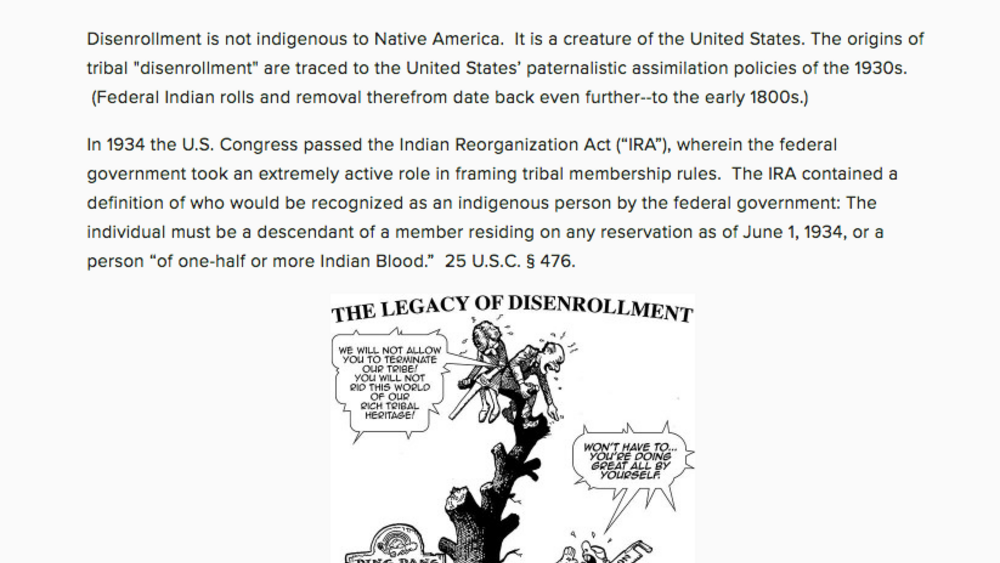Indigenous Governance Database
Gabriel S. Galanda

Blood Quantum and Sovereignty
"Blood Quantum and Sovereignty" is a beginner-level conversation focused on why blood quantum is controversial, as well as how it came to be used as an enrollment and citizenship criteria for Native nations. Produced and recorded by Native Governance Center on March 30, 2022. Featuring: Wayne…
NNI Forum: Tribal Sovereign Immunity
Tribal sovereign immunity has far-reaching implications, impacting a wide range of critical governance issues from the protection and exertion of legal jurisdiction to the creation of a business environment that can stimulate and sustain economic development. Native Nations Institute (NNI) Radio…

The Unintended Consequences of Disenrollment
For most of the modern tribal self-determination era, American Indian nations have emphasized inclusion. Starting in the early 1970s, higher tribal membership numbers equated to higher federal self-determination dollars. As tribes otherwise redoubled their efforts to reverse the destruction caused…

Disenrollment Is a Tool of the Colonizers
Our elders and spiritual leaders do not teach the practice of disenrollment. In fact, disenrollment is a wholly non-Indian construct. Indeed, when I recently asked Eric Bernando, a Grand Ronde descendant of his tribe’s Treaty Chief and fluent Chinook Wawa speaker, if there was a Chinook Wawa word…

Tribal Per Capitas and Self-Termination
For many Indian families, tribal per capita payments help meet their most basic needs. They buy food, pay heating bills, make car payments, and open savings accounts. As a Dry Creek Rancheria Band of Pomo Indians leader explains, per capita monies have given historically impoverished Indian…

The Bay Mills Buck Stops With NIGC
With a case of potentially catastrophic consequence for Indian country now pending before the U.S. Supreme Court, all of the players who can possibly prevent the disaster are either sitting on their hands or pointing fingers. The National Indian Gaming Commission has failed to act, citing a…

How Tribal Leaders Are Creating Jobs
The New Markets Tax Credit (NMTC) has provided a vital spark to infrastructure and economic development projects across Indian country. Momentum has been building over the past several years but because of recent federal agency actions, and now tax-related Congressional bickering, it is in danger…

How to Protect Tribal Lands From Our Deadliest Enemies
In 2001, the U.S. Supreme Court dealt a severe below to Indian sovereignty when it decided Nevada v. Hicks, suggesting to states and counties that when their cops are investigating off-reservation crimes, they need not obtain tribal court warrants to conduct searches or arrests on tribal land. The…

Indian Nations Are Still Fighting the U.S. Cavalry
Throughout the 19th Century the U.S. Cavalry perpetrated the genocide of Indian People. Today’s Cavalry–federal, state and local police–are no longer committed to extermination. But American cops’ flagrant disregard for tribal self-governance when carrying out law enforcement activities on Indian…

Advancing the State-Tribal Consultation Mandate
This summer, in the face of an impending private land sale of Pe’Sla, a Lakota/Dakota/Nakota Indian sacred site in the Black Hills, the United Nations Special Rapporteur on the Rights of Indigenous Peoples, S. James Anaya, directed that authorities in South Dakota “engage in a process of…

Tribal Per Capita Poverty - How About Disenrollment Bankruptcy?
“In November, a [Las Vegas] Review-Journal reporter and photographer encountered one of the disenrolled, 52-year-old Darla Hatcher, sleeping with her meager belongings in front of an upholstery shop in the homeless corridor. By way of introduction, she gestured toward nearby tribal land and said…

An Essay on the Federal Origins of Disenrollment
Disenrollment is not indigenous to Native America. It is a creature of the United States. The origins of disenrollment are traced to the United States’ paternalistic assimilation policies of the 1930s. In 1934 the U.S. Congress passed the Indian Reorganization Act (“IRA”), wherein the federal…
